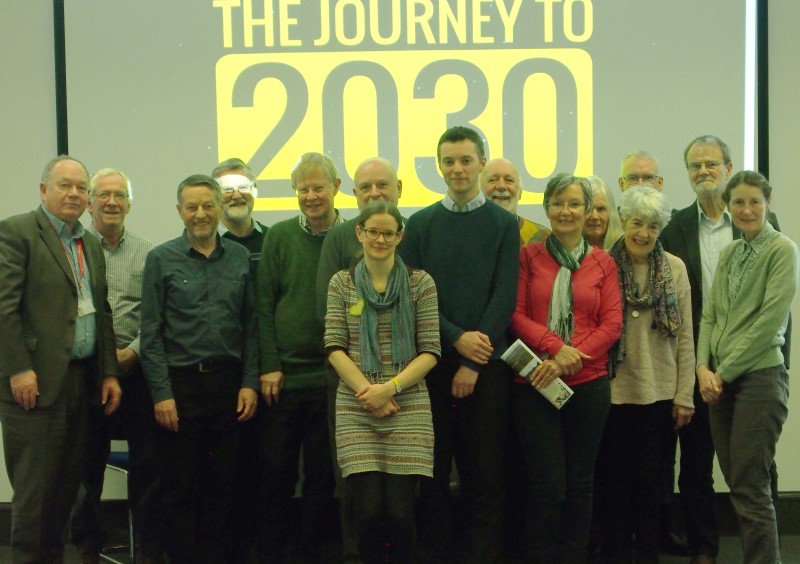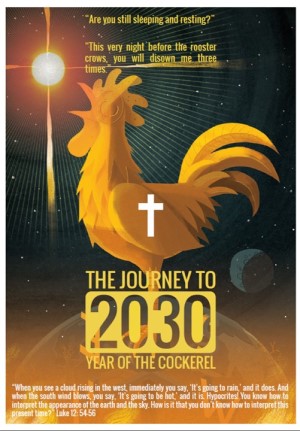This group has been meeting a couple of times a year for the last two years.
It is a way of sharing information on the work being done about the Climate Crisis in the northern dioceses (by which I mean Liverpool, Lancaster, Salford, Leeds, Hallam, Middlesbrough and Hexham and Newcastle). Mark Wiggin, Caritas Director for the Salford Diocese has kindly hosted these meetings at their wonderful conference centre adjacent to Salford Cathedral.
The last meeting (at the end of January) was an opportunity to find out more about what is happening at the level of the Catholic Bishops’ Conference of England and Wales. Usually the meeting comprises a bit of a ‘go round’ on what is happening with one or two keynote speakers. For this meeting Edward de Quay of the Environmental Advisory Group of the Bishop’s Conference was given most of the time available.

Some of the key points that he made about the national scene were as follows:
• Bishop John Arnold (Diocese of Salford) has the responsibility for the Environment in the Bishops Conference; he has pledged not to travel by air for leisure purposes. He is also developing the Laudato Si Centre at his home at Wardley Hall as a place where people can be inspired to take up the call to action set out in Laudato Si.
• There is a push to have an Environment Officer in each diocese. Edward is very interested in the Diocesan Environment Policies that are being developed across England and Wales. The environment officer would be the person with responsibility in a diocese for making sure that the policy is implemented.
• At this time, we don’t know what the carbon footprint is of the Catholic Church in England & Wales. Westminster Diocese has produced a way for parishes to calculate their carbon footprint – but there has been no systematic measurement of this across the country.
• Green Energy in parishes, through the diocese inter-fuel arrangements, is in place for most dioceses now – but it is not common in Catholic schools yet. The situation here is more complicated with the creation of many ‘Academy Trusts’ which are independent entities.
• The Bishops have decided that there will be a Climate Sunday – in September this year, during the Season of Creation.
• COP 26 is in Glasgow later in the year. Some delegates from France and Germany intend to walk across most of England and into Scotland and the diocese through which they pass will be invited to provide hospitality for them
 Edward, himself, has an interesting background. Prior to his current role, along with his brother, he lived in the diocese of Arundel & Brighton. After the publication of Laudato Si they set up a group called the ‘Ecological Conversion Group’. Out of this has grown a whole programme of work called ‘The Journey to 2030’. This is all about recognising the huge importance of the Climate Crisis for us as Christians. They have developed a set of resources to help parishes find out more, create a sense of urgency within the Church and promote the most effective actions in our race against time (hence the use of 2030 in the title – the year by which we must significantly curb our greenhouse gas emissions
Edward, himself, has an interesting background. Prior to his current role, along with his brother, he lived in the diocese of Arundel & Brighton. After the publication of Laudato Si they set up a group called the ‘Ecological Conversion Group’. Out of this has grown a whole programme of work called ‘The Journey to 2030’. This is all about recognising the huge importance of the Climate Crisis for us as Christians. They have developed a set of resources to help parishes find out more, create a sense of urgency within the Church and promote the most effective actions in our race against time (hence the use of 2030 in the title – the year by which we must significantly curb our greenhouse gas emissions
Edward felt compelled to point out that the cockerel on the front is nothing to do with the Chinese Year of the Cockerel! It is a reference to the story of St Peter and the cockerel – to emphasise our denial of Jesus in the signs of our times.
FIND OUT MORE AND DO MORE
Many individuals and groups across the diocese are already taking action on Climate Change. If there is one near you then why not join them?
The Commission is in the process of setting up a Climate Change Action Group – to help guide the Commission in what it can do. We would welcome more members. Email the office for more details.
The ‘Journey to 2030’ guide can be downloaded from the website set up specifically about this goal
www.journeyto2030.org/
The Ecological Conversion Group also has a website
www.theecg.org/
Westminster Diocese has developed a tool for helping parishes assess their carbon footprint. This is now available for download from the Climate change page on our website.
Another great source of information and ways of measuring your parish’s carbon footprint is by using the tools provided by the Carbon Trust. Many are aimed at Small & medium Enterprises and, with a bit of imagination, a parish can fit into that categorisation of organisation.
www.carbontrust.com
